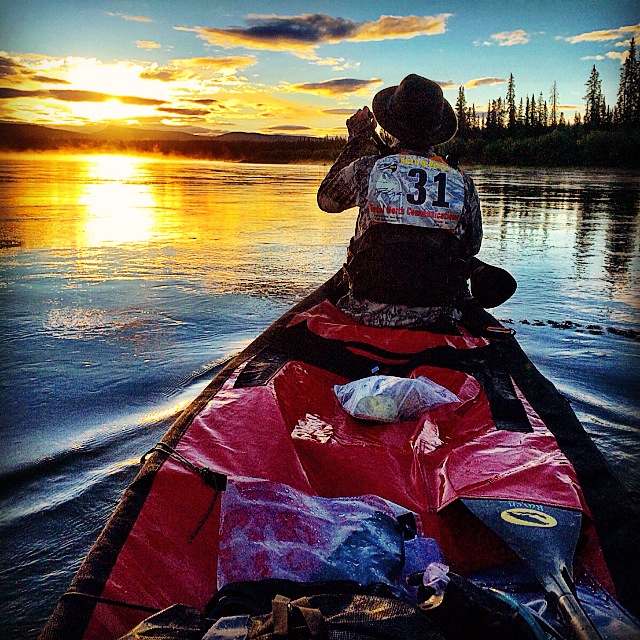For most people, a vacation entails relaxing in hot weather, a vacated schedule and a full glass of one’s choicest libation. However, for some of the more adventurous amongst us – vacation is a prime opportunity to “push” one’s self in a different direction from the normal day to day routine.
I am squarely in the latter category. This year my sights were set on the Yukon River Quest – a 715km (444 mile) wilderness adventure paddling race down the Yukon River. Aptly billed as a “Race to the Midnight Sun” the Yukon River Quest is the longest annual canoe and kayak race in the world, departing from Whitehorse and finishing in Dawson City, Yukon.
Outside of two mandatory rest stops, which were implemented some years ago to protect the racers from the destructive nature of the race on their bodies, competitors effectively paddle around the clock for three days northward.
This year’s race was comprised of 153 racers and 66 teams from 12 different countries competing for the chance to complete the marathon paddle.
Yukon means “great river” to the local Gwich’in people and has a rich history. While it is commonly known that the Yukon River served as the main highway for prospectors staking their claim in the 19th century during the gold rush period, anthropologists also believe that the Yukon River valley was the mode in which traditional aboriginal peoples first made their way into North America on a southward route from Asia and northern Siberia.
With more than a healthy amount of apprehension, myself and my paddle partner, both novice canoeists by anyone’s measure, set off with humble psyches, knowing full well that we had no idea what to expect, from the river, ourselves and our abilities – primarily how we planned to operate for three days without sleep.
Indeed for many of the racers, to finish the race is the goal.
We quickly discovered that paddlers (counting ourselves amongst them) share a universal sense of adventure and appreciation for this traditional mode of travel. Yet, in the face of this shared camaraderie, the act of paddling is a supremely individual pursuit.
As one seasoned racer wryly pointed out, if the Yukon River were human, one might describe that person as being susceptible to a life of impressive mood swings.
And so our paddle began.
North from Whitehorse to the mouth of Lac Laberge,- a place made famous by Robert Service, most notably in his poem “The Cremation of Sam McGee”- a 50 km lake that everyone agrees is the toughest portion of the race due to its size and the severe weather that typically develops. This year was no exception. As it happened five boats capsized on the lake due to large waves and wind and had to be rescued by fellow paddlers.
Many continued; some quit. In all 22 teams withdrew in the first 24 hours of the race – a testament to the gruelling nature of the event.
After successfully navigating large waves and heavy weather on Lac Labarge, the Yukon River begins its winding dance, through soaring chasms, sandstone cliffs and meandering oxbows that stretch for miles. Passing decrepit prospector cabins, scattered remains of traditional trading posts and, once bustling settlements such as Fort Selkirk, Hootalinqua and Big Salmon, now abandoned. We made our way northward for two days and two nights under a sun that seemed to hang on the horizon at all manners of the day.
With weary limbs and minds, pushed well past the point of exhaustion, we landed in the time-frozen-town of Dawson City early Saturday, nearly 59 hours after starting the race the preceding Wednesday.
It would be a folly to attempt to sum up the whole experience in one word but – vastness, comes to mind. Vast in size and space, the Yukon River and its far-reaching valleys and tributaries are simply a pristine behemoth tract of land isolated.
The disillusion of time also attracts vast qualities. Paddling around the clock, under 24 hours of day light, one’s equilibrium notably disintegrates. Even the most rational of minds suddenly reveal their quixotic selves and most paddlers share common stories of hallucinations born of grand exhaustion. This writer included.
While it is easy to get swept up in the lore of the north, for the most ardent of folk paddling the Yukon River is an exercise in retracing history and a pursuit of indefinite pleasure.
As Robert Service famously wrote, and may offer as a final statement as to the spirit of the Yukon:
There’s a land where the mountains are nameless.
And the rivers all run God knows where;
There are lives that are erring and aimless,
And death that just hang by a hair;
There are hardships that nobody reckons;
There are valleys unpeopled and still;
There’s a land – oh, it beckons and beckons,
And I want to go back – and I will.
